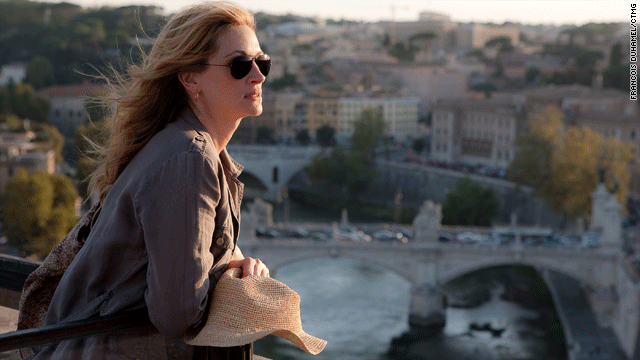Eat, Pray, Adapt: Making a book into a film

- "Eat, Pray, Love" screenwriter says adapting book for screen was a challenge
- Jennifer Salt said there were parts of the book she loved and wanted in the film
- Editor says writers have to handle adaptations in a way that will please fans and be creative
(CNN) -- Screenwriter Jennifer Salt knows fans will be watching her work very closely.
Salt adapted the memoir "Eat, Pray, Love" for the screen and is keenly aware that there is a lot riding on the film based on the beloved book. After all, she too found herself pulled into the pages of the best-seller written by Elizabeth Gilbert.
"There were things in the book that I loved, things that Ryan [Murphy, the director] loved and the sense from the author, Elizabeth Gilbert, of things that the audience of the book really loved," Salt said. "I think we felt a responsibility to try and include them all, but at a certain point, you can't accommodate them all."
It's a fine balance for any screenplay writer adapting a work already in existence, but especially with a book such as "Eat, Pray, Love" which documented Gilbert's yearlong odyssey abroad with stops in Rome, India and Bali after a painful divorce. Fans have had an immensely personal connection with Gilbert's memoir and have eagerly awaited its translation to screen.
Salt, a former actress who starred in the 1970s sitcom "Soap," also feels that connection. Not only did she love the book, but Salt also for a time followed the same guru who plays such a pivotal role in Gilbert's book.
So it seemed serendipitous when Salt's friend, Ryan Murphy, gave her a copy of the book to read.
The pair are longtime friends, and Salt worked for years on his hit television series "Nip/Tuck." She said she was overjoyed when he told her he was developing "Eat, Pray, Love" for the screen and wanted her to adapt the screenplay with him.
From the beginning, she says they knew it would be a challenge.
"[The book] wasn't laid out with those natural climaxes and conflicts," Salt said. "We at first looked at it and thought we kind of had to invent a story in a way because [the book] was episodic and at the end of each chapter, you had a resolution."
"Resolution is not something you want in a screenplay," she added. "It's the lack of resolution which drives you to the end of the story, so it was tricky."
iReport: Did you 'Eat, Pray, Love?'
But that also allowed for a bit of creativity, which Salt says viewers need to expect when the film hits the theaters. Melissa Rosenberg writes the "Twilight" films and told CNN in June that there is so much more to adapting a book than just following the storyline.
"People think of screenplay writing as dialogue," Rosenberg said. "Dialogue is actually the icing on the cake. The cake itself is about structure, and character arcs and creating scenes. Sometimes the best scenes have no dialogue."
And adaptations can be big business as they bring along with them a built-in audience. Earlier this year, the British publication The Guardian reported that supermarket giant Tesco had launched a production company that would make films based on best-selling books.
Jeff Goldsmith is senior editor for Creative Screenwriting Magazine, a publication that hosts the Screenwriting Expo, the largest screenwriting conference in America, held annually in Los Angeles, California.
Goldsmith said that for writers, "It's important to stay as true as you can to the narrative of the book."
"The leisure time you have is how you address your characters and the dialogue," he said. "If there are new ways of making the dialogue seem fresh even though the story is moving in the same direction then that works. Also, for the action sequences, you have a little more liberty on the screen than you do on the page."
Goldsmith said there are no absolutes governing how closely a screenplay has to follow a book, and he has heard of cases where authors have actually encouraged screenwriters to make a project their own.
Yet as Hollywood continues to try to lure fans into theater seats, it's a pretty safe bet that there will be more adaptations of literature, comic books, graphic novels and any other media that have already proved to be a hit, Goldsmith said. The industry just has to make sure that they strike the right note with the audience, he said.
"The thing that you never want to hear is that the book was better than the film," Goldsmith said. "For instance, in the case of 'Scott Pilgrim vs. the World,' which comes out on August 13, that's based on six volumes of comics that are over 700 pages, and they had to condense that. The comics have a huge following and having read all six volumes and seen the film, they did a really good job."
Salt said she believes viewers will also be pleased with "Eat, Pray, Love" at the theater even if they haven't yet read the book.
Ending up with a movie that bears no resemblance to the book is often a writer's worst nightmare, though author Dennis Lehane, whose "Mystic River," "Gone Baby Gone" and "Shutter Island" have all made it to the big screen, scoffs at the notion.
"It's like the guy who comes out of the whorehouse complaining that he didn't feel loved," Lehane told DigitalJournal.com in May.
"We're not babes in the woods. We know the process. We take the money, they invest in an interpretation of our work, and we just shut up."
